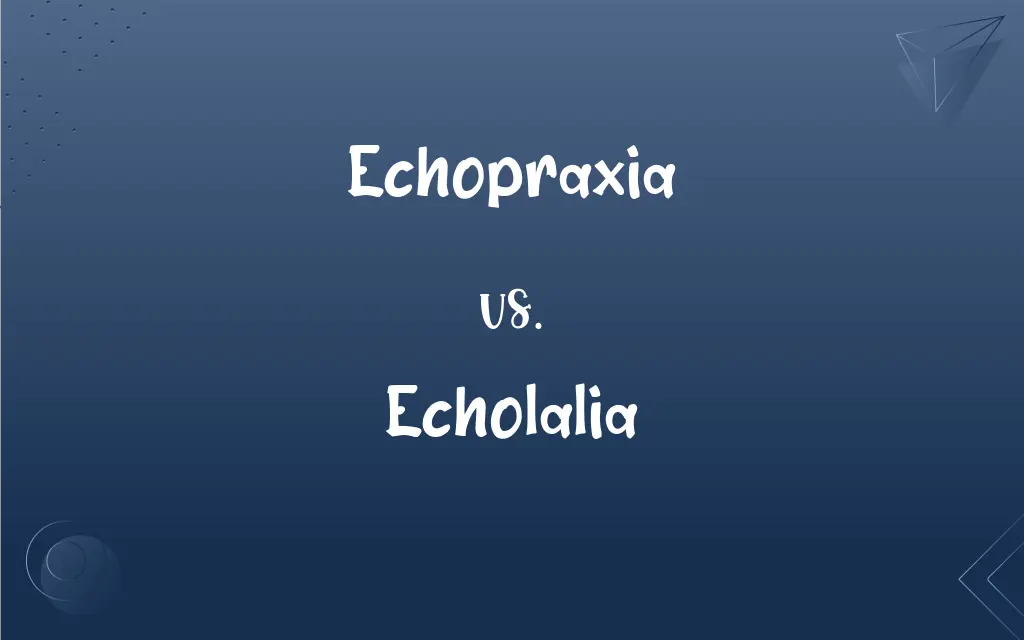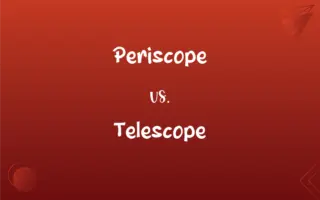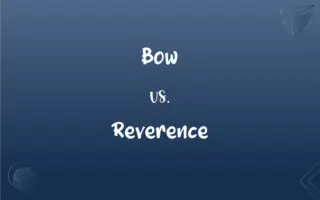Echopraxia vs. Echolalia: What's the Difference?
Edited by Harlon Moss || By Janet White || Updated on October 3, 2023
Echopraxia is the involuntary repetition of another's actions, while Echolalia is the involuntary repetition of spoken words.

Key Differences
Echopraxia and Echolalia both refer to involuntary repetition behaviors, but they manifest in different ways. Echopraxia is centered around the copying of physical actions.
For instance, if someone were to see another person clapping and then involuntarily began clapping themselves, they'd be displaying echopraxia.
Echolalia, in contrast, is all about speech. It's when an individual hears certain words or phrases and then involuntarily repeats them. Both Echopraxia and Echolalia can be observed in various neurological and psychiatric conditions.
For example, they might be present in conditions like Tourette's syndrome or certain types of autism. Importantly, while Echopraxia focuses on the physical and Echolalia on the verbal, both represent a lack of control over one's immediate reactions to external stimuli.
Both conditions provide valuable insight into how our brains process imitation and repetition. Their study can inform therapeutic approaches and deepen understanding of neural functions.
ADVERTISEMENT
Comparison Chart
Nature of Repetition
Physical actions
Spoken words
Examples
Clapping, jumping
Repeating phrases, words
Associated Conditions
Autism, Tourette's, schizophrenia
Autism, Alzheimer's, Tourette's
Root Word
"Praxis" meaning action
"Lalia" meaning speech
Area of Study
Neuropsychology of action imitation
Neurolinguistics and speech pathology
ADVERTISEMENT
Echopraxia and Echolalia Definitions
Echopraxia
The involuntary imitation of another's actions.
Upon seeing his friend wave, he displayed echopraxia by also waving without realizing it.
Echolalia
Symptom observed in some speech disorders.
His echolalia made conversations repetitive as he echoed what was said to him.
Echopraxia
Automatic copying of observed movements.
Without intention, her echopraxia made her mimic the clapping audience.
Echolalia
Automatic repetition of verbal stimuli.
Upon hearing the song, her echolalia had her singing the same line repeatedly.
Echopraxia
Neurological condition where actions are echoed.
The child, due to echopraxia, would mimic every hand gesture her teacher made.
Echolalia
A speech condition where heard phrases are echoed.
Echolalia made her repeat the last sentence of the story verbatim.
Echopraxia
A symptom observed in some neurological disorders.
Echopraxia was evident when he copied the dance moves of those around him.
Echolalia
Reflective speech repetition without understanding.
Her echolalia caused her to repeat the foreign phrase without knowing its meaning.
Echopraxia
Reflective action repetition without conscious intent.
His echopraxia was evident when he started imitating the chef's chopping actions on TV.
Echolalia
Involuntary repetition of words just spoken by others.
When asked his name, due to his echolalia, he just repeated the question.
Echopraxia
The involuntary imitation of movements made by others, sometimes occurring in people with schizophrenia and certain other mental disorders.
Echolalia
The repetition of words or phrases spoken by others, often occurring in people with autism spectrum disorder and certain other mental disorders.
Echopraxia
The involuntary repetition or imitation of the observed movements of another.
Echolalia
(clinical psychology) The immediate, involuntary, and repetitive echoing of words or phrases spoken by another.
Echolalia
An infant's repetitive imitation of vocal sounds spoken by another person, occurring naturally during childhood development.
Echolalia
Any apparently meaningless, repetitious noises, especially voices.
Echolalia
An infant's repetition of sounds uttered by others
Echolalia
(psychiatry) mechanical and meaningless repetition of the words of another person (as in schizophrenia)
FAQs
Are Echopraxia and Echolalia both related to repetition?
Yes, Echopraxia is about repeating actions, while Echolalia is about repeating words.
Are there treatments for Echolalia?
Therapies, especially speech therapies, can help manage Echolalia.
Can Echolalia occur in adults?
Yes, Echolalia can be seen in both children and adults with certain conditions.
Can someone have both Echopraxia and Echolalia?
Yes, both can coexist in some neurological or psychiatric conditions.
Is Echopraxia a sign of autism?
Echopraxia can be observed in some individuals with autism, but not all.
Can Echopraxia occur spontaneously?
Yes, it can happen without a direct trigger in some cases.
Is Echopraxia limited to mimicking complex actions?
No, it can involve simple actions like clapping or complex ones.
How can one differentiate between Echolalia and learning repetition?
Echolalia is automatic and often without understanding, while learning repetition is intentional.
Why do some people with Tourette's syndrome display Echolalia?
Echolalia can be a type of vocal tic in Tourette's.
Are there medications for Echopraxia?
Medications can address underlying conditions, but there's no specific drug for Echopraxia.
Are Echopraxia and Echolalia lifelong conditions?
It varies. For some, it's developmental and transient, while for others, it may persist.
Is Echolalia always a sign of a disorder?
No, it can occur developmentally in children as they learn speech.
Is Echopraxia related to the brain's mirror neurons?
Some researchers believe mirror neurons play a role in behaviors like Echopraxia.
Can Echopraxia be intentional?
By definition, Echopraxia is involuntary, so it's not done with conscious intent.
Can stress exacerbate Echopraxia symptoms?
It's possible, as stress can intensify many neurological and psychiatric symptoms.
Can Echolalia involve repeating longer sentences?
Yes, Echolalia can involve echoing phrases or even longer sentences.
Can therapies reduce Echopraxia symptoms?
Yes, occupational and behavioral therapies can be beneficial.
How is Echolalia different from simply repeating after someone?
Echolalia is involuntary and might not have understanding attached, unlike deliberate repetition.
How common is Echolalia in Alzheimer's patients?
Echolalia can be a symptom in some individuals with Alzheimer's.
Is Echolalia a developmental stage in children?
Echolalia can be a normal part of language development in early childhood.
About Author
Written by
Janet WhiteJanet White has been an esteemed writer and blogger for Difference Wiki. Holding a Master's degree in Science and Medical Journalism from the prestigious Boston University, she has consistently demonstrated her expertise and passion for her field. When she's not immersed in her work, Janet relishes her time exercising, delving into a good book, and cherishing moments with friends and family.
Edited by
Harlon MossHarlon is a seasoned quality moderator and accomplished content writer for Difference Wiki. An alumnus of the prestigious University of California, he earned his degree in Computer Science. Leveraging his academic background, Harlon brings a meticulous and informed perspective to his work, ensuring content accuracy and excellence.































































